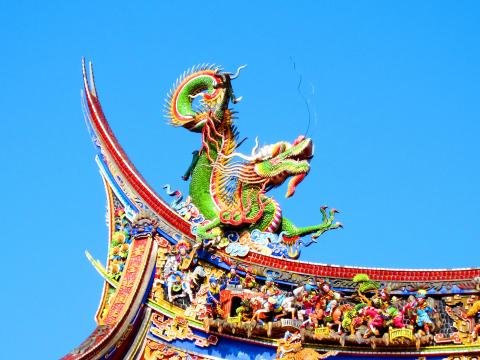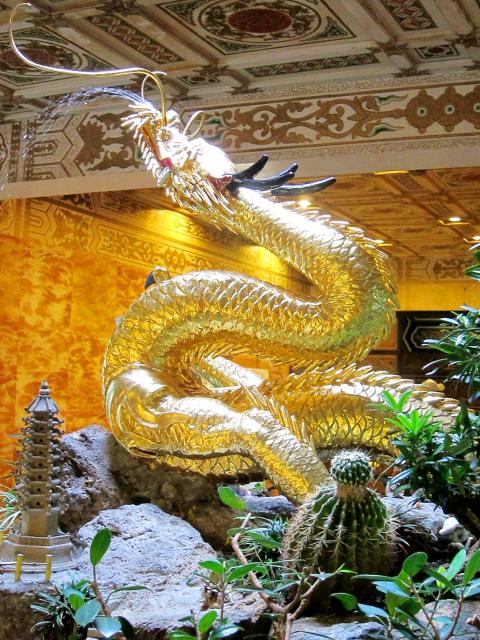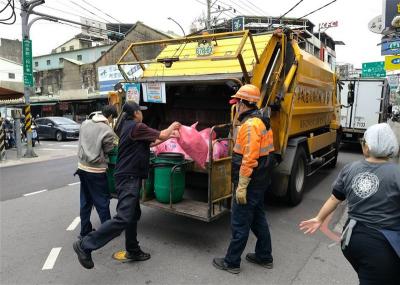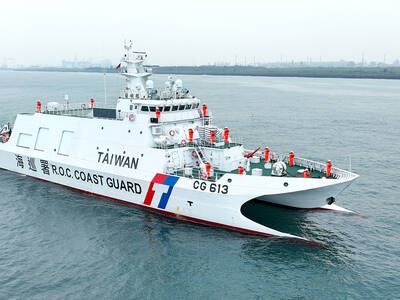The Year of the Dragon carries significance in Chinese societies as it symbolizes power, success and luck, and this holiday can be a perfect time for a trip in search of the legendary creature in Taipei.
While temples abound in dragon sculptures, the Grand Hotel may be a good place to start, with the landmark structure on Yuanshan featuring more than 210,000 dragons in different shapes and styles.
Carvings of the legendary creature can be found on the rooftop, columns, ceiling and walls, but what has attracted the attention of most tourists and hotel guests alike is the sculpture sitting in the Golden Dragon Hall on the second floor.

Photo: Mo Yan-chih, Taipei Times
The dragon sculpture is what remains of the temple that used to sit on the site of the current Grand Hotel. The temple, known as the Taiwan Shrine, was destroyed during World War II. How the brass dragon sculpture survived the war has become a local legend, and residents have come to worship the dragon and pray for good fortune.
The so-called “dragon-tail cave” was later selected by Soong May-ling (宋美齡) to build the hotel in 1952. According to Feng Chi-wei (馮志偉), a public relations specialist at the hotel, the brass dragon continued to be a popular attraction among hotel guests, especially from Japan and China, who would visit the spot and worship the dragon.
Feng said the 100-year-old brass dragon was different from traditional Chinese-style dragons as it only has three claws, rather than five, and therefore the dragon could be a work of the Japanese during the colonial period.

Photo: Mo Yan-chih, Taipei Times
The hotel plated the brass dragon with gold in 1987 during its renovation and plated it again last year to enhance its luster for the Year of the Dragon, he added.
Another refined decoration featuring dragons in the hotel is the plum-blossom shaped sculpture in the lobby’s ceiling. The intricate artwork features 28 dragons and 16 phoenixes as a symbol of fortune.
Downhill from the hotel is another great spot to search for dragons — Bao-an Temple (保安宮). Located in the Dalongdong (大龍峒) area, Bao-an Temple is one of the three major temples in Taipei — along with Longshan Temple (龍山寺) and Master Chingshui Temple (清水祖師廟). The structure of the temple is known for its grand scale and refined carvings, with colorful dragons situated on the rooftops.
The four dragon columns in front of the temple feature dragons carved out of octagon columns, and the stone sculpture is a fine representation of Qing Dynasty art in the 1800s.
Another temple with grand dragon sculptures that should not be missed is Longshan Temple in Wanhua District (萬華). Built in 1738, the temple is a center of worship for Guanyin, or the goddess of mercy, among other deities. As one of the major Buddhist temples in Taiwan, Longshan demonstrates the best in traditional Chinese temple architecture.
According to Longshan’s management, it is the only temple in Taiwan that features bronze dragons on both its right and left pillars at the main entrance — a symbol of the dragons’ protection of the main hall.
The rooftops of the temple are decorated with dragons and phoenixes pasted with colorful glass and ceramics, adding vigor to the solemn temple.
Both Bao-an and Longshan Temple are listed as Class 2 monuments with structures well-preserved in ancient forms, and both are top choices for observation of Chinese-style dragon sculptures or icons, said Angel Chen (陳譽馨), a division chief at Taipei City’s Department of Information and Tourism.
Chen suggested that visitors, on the sideline of the dragon trip, could also sample traditional Taiwanese food near the temples — from sweet porridges to braised pork rice.
“Visiting temples to worship and pray for good fortune is a local tradition during the Lunar New Year, and for the Year of the Dragon, taking some time to enjoy the refined dragon sculptures while praying should be great,” she said.
For a great festive atmosphere and modern-style dragons, the annual Lantern Festival in Taipei presents dragons in creative and animated forms.
The festival, which runs from Feb. 2 to Feb. 12, will feature a giant dragon-shaped lantern at the Sun Yat-sen Memorial Hall’s main lantern area. Aside from the main lantern, titled “Happy Dragon,” visitors can also view dragons in the “Fish Leaping the Dragon Gate” area at the hall, where a fusion of real and virtual lanterns depict folk legends about dragons.
Visitors can get a sneak preview of the festival on Jan. 30 at the lantern-lighting trial run, according to Taipei City’s Department of Civil Affairs.
Following visits to dragons around the city, a trip to an exhibition on dragons at Taipei Zoo would be a great way to end the trip.
The exhibition, which runs through Jan. 30, includes displays of relics of dinosaur eggs, pictures and stories about dragons.
Organizer Tang Hsin-jie (唐欣潔) said the exhibition gives an interesting background to the legendary creature, such as the origin of the noblest animal in Chinese legend, which is a combination of a camel’s head, eagle’s claws, snake’s neck, rabbit’s eyes, bull’s ears, and scales of carp.
Many zoologists believe that the crocodile is the primary form of Chinese dragons, and visitors can check out crocodiles or alligators in the zoo, Tang added.
The zoo, which was closed yesterday, reopens today.

The US House of Representatives yesterday passed the PROTECT Taiwan Act, which stipulates that Washington would exclude China from participating in major global financial organizations if its actions directly threaten Taiwan’s security. The bill, proposed by Republican US Representative Frank Lucas, passed with 395 votes in favor and two against. It stipulates that if China’s actions pose any threat to Taiwan’s security, economic or social systems, the US would, “to the maximum extent practicable,” exclude China from international financial institutions, including the G20, the Bank for International Settlements and the Financial Stability Board. The bill makes it clear that China

Garbage and recycling schedules are to vary from Saturday through Sunday next week over the Lunar New Year holiday period. The following collection information is from the governments of the six special municipalities. Taipei Regular service: Sunday to Monday next week. No service: Tuesday to Thursday next week. Extra service: Friday next week. Regular service resumes: Saturday next week. New Taipei City Extra service: Sunday. Adjusted collection time: Monday next week — garbage collection is to begin in the morning and end at 6pm. No service: Tuesday to Thursday next week. Regular service resumes: Friday next week. Note: Garbage can be dropped off at 70

Taiwan’s Li Yu-hsiang performs in the men’s singles figure skating short program at the Milano-Cortina Winter Olympics, in Milan, Italy, on Tuesday. Li finished 24th with a score of 72.41 to advance to Saturday’s free skate portion of the event. He is the first Taiwanese to qualify for the free skate of men’s singles figure skating at the Olympics since David Liu in 1992.

The Coast Guard Administration (CGA) yesterday held a ceremony marking the delivery of its 11th Anping-class offshore patrol vessel Lanyu (蘭嶼艦), saying it would boost Taiwan’s ability to respond to Beijing’s “gray zone” tactics. Ocean Affairs Council Deputy Minister Chang Chung-Lung (張忠龍) presided over the CGA event in the Port of Kaoshiung. Representatives of the National Security Council also attended the event. Designed for long-range and protracted patrol operations at sea, the Lanyu is a 65.4m-long and 14.8m-wide ship with a top speed of 44 knots (81.5kph) and a cruising range of 2,000 nautical miles (3704km). The vessel is equipped with a